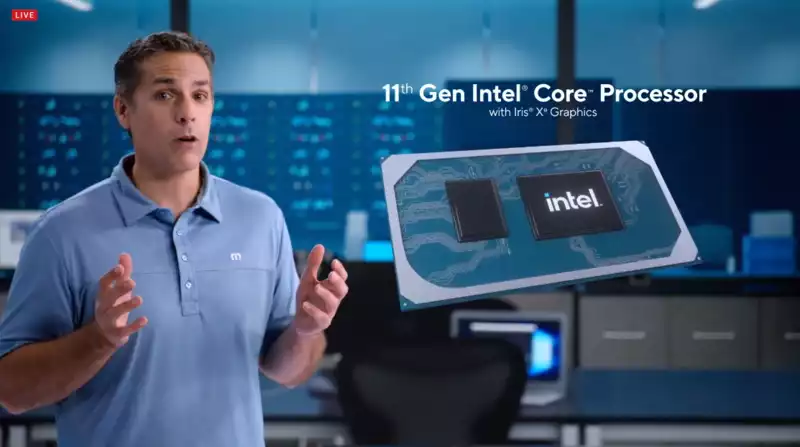Intel has announced the much-anticipated Tiger Lake processor, the precursor to the 11th generation of Intel processors. The new processors promise all-around improvements, including faster performance, better battery life, and more features for everything from content creation to gaming in a more portable package.
Today, Intel announced new 11th generation Core i3, Core i5, and Core i7 processors for ultra-portable notebooks, with over 50 new models in time for the holiday season, as well as Acer, Asus, Dell, Dynabook, HP, Lenovo, LG, MSI, Razer, Samsung, and others announced a total of over 150 new designs.
Intel has moved to a 10-nanometer manufacturing process for this latest batch of processors. This allows for more densely packed transistors, which means faster performance, lower power requirements, and overall power packed into the same or smaller chip size.
But Intel's new design did not stop there. First, the new CPUs use Intel's SuperFin technology. This extracts more performance from each transistor, allowing the same performance to be obtained with less voltage.
Intel engineers also reworked the CPU's metal stack (the layers of three-dimensional circuitry that make up the processor). By optimizing these layers for performance and power efficiency, they have further reduced the power requirements of the new processor, while simultaneously delivering faster performance.
Intel claims that these enhancements combine to deliver 20% faster performance with twice the graphics performance of 10th generation chips and a 5X improvement in AI performance.
While these two key improvements, low power consumption and fast performance, are important for any new processor, Intel has also made some less abstract enhancements to its 11th generation CPUs.
Among them, the new chips integrate Thunderbolt 4 support, which significantly increases the bandwidth offered by a single connection, supports PCIe Gen4, and supports up to four 4K displays at once.
Internet connectivity is also greatly enhanced, with integrated support for Wi-Fi 6, providing faster connectivity to laptops and smarter connection management to further improve battery life.
All of these features combined promise faster processing and better overall capabilities than ever before.
During the stream of the launch event, Intel demonstrated the new 11th generation processors in a variety of applications, from photo retouching to gaming.
In one such demo, the 11th-Gen and AMD 4800U were compared in photo retouching, image colorization and upscaling using Topaz Gigapixel AI The Intel system handled the task in under 40 seconds, while the AMD took over 2 minutes or more.
Another demo featured a game with integrated graphics compared to the AMD 4800U and Nvidia MX350 running on one of last year's 10th-generation Intel Core processors. Playing the racing game "GRID," the Nvidia and AMD machines recorded frame rates in the low to mid 30% range, while the new 11th generation Intel Core CPUs with Iris X Graphics were around 55% faster than playable The results were.
Intel's Core i5 and Core i7 processors, now only available in quad-core models, can process up to eight simultaneous threads. Cache sizes range from 8MB to 12MB, with base speeds of 2-3GHz and turbo speeds up to 4.8GHz.
It also includes Intel Iris X graphics based on the Xe Graphics architecture.
Lower CPUs in the Core i3 line will offer dual-core processing with up to four threads and will feature Intel UHD Graphics, an updated version of the current UHD graphics solution.
Intel promised that new 11th generation processors will begin shipping before the vacations, with up to 20 laptop models featuring the new hardware by the end of the year and 150 models in 2021.
Many of these will be announced today and tomorrow, but we are already getting details on some upcoming systems.
Acer will launch its new 14-inch ultra-portable laptop, the Acer Swift 5, this October, with prices starting at $999. Powered by Intel's 11th generation processor and Xe graphics, the 14-inch 1920 x 1080 resolution IPS touchscreen, and is expected to weigh less than 2.2 pounds.
Acer announced that the Swift 5 can be equipped with up to 16GB of LPDDR4X memory, M.2 PCIe SSD storage, and an optional Nvidia GeForce MX350 graphics card. However, given the graphics capabilities demonstrated today, newer Xe-based graphics may displace the Nvidia cards. [The Lenovo IdeaPad Slim 9i is a 2.64-pound ultraportable poised to compete with higher-end models like the Dell XPS 13. In addition to a new processor and graphics, it will feature a 14-inch 4K touchscreen display with HDR and Dolby Vision, dual front-facing speakers with Dolby Atmos, and will start at $1,599 when it launches in November.
Other models mentioned by Intel include Samsung's Galaxy Book Flex 5G and Asus' Zenbook Flip S
.









Comments